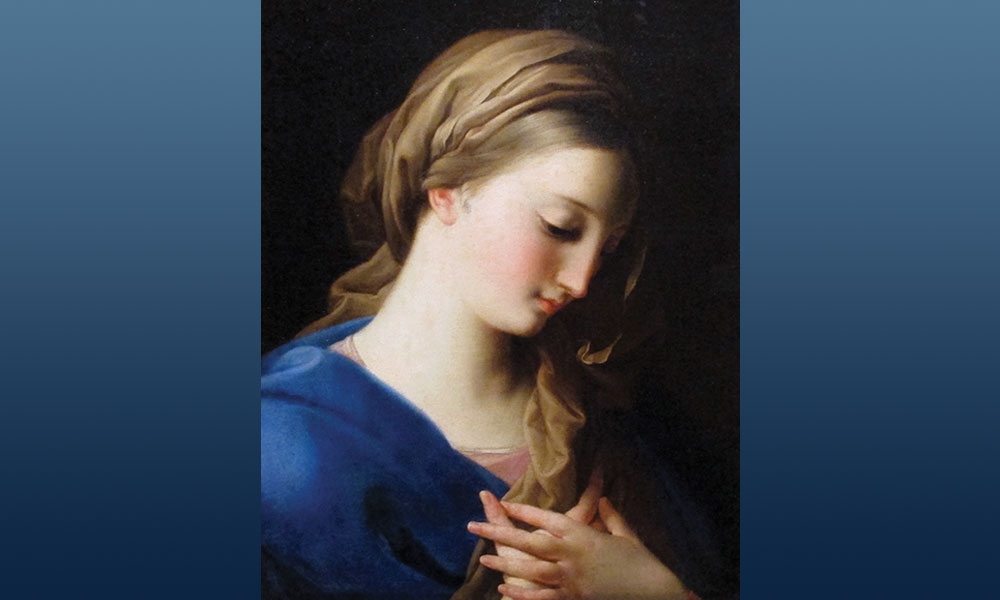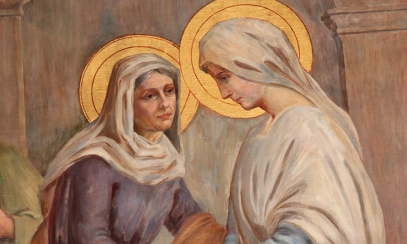
Free to Love
A Meditation on the Immaculate Conception
A Meditation on the Immaculate Conception
Mary isn’t “just like everybody else,” and that’s a good thing.
“Where two or three are gathered,” one of my theology professors used to quip, “there will be conflict.”
Even in the most intentional, faith-filled human communities, small lapses in charity invariably occur. Anyone who has experienced marriage, family life or religious life for even a few weeks can attest to the fact that human beings are inconsistent lovers. We may even know that loving God and neighbor – the command in which all other biblical commands are contained – requires sacrifice and self-forgetfulness; nevertheless, I have never met anyone who has not, at some point, fallen short of the ideal.
What inhibits our ability to love?
Cartoonists might depict it as the devil on your shoulder, but the Church has given it a more precise name: concupiscence.
While baptism removes the stain of original sin from our souls, certain effects remain. One of these, concupiscence, can be broadly defined as our inclination toward sin. Unfortunately, it is this propensity which inclines us to selfishness and (when acted upon) poisons our relationships and isolates us from each other.
Now imagine a heart that does not labor under the effects of original sin. Imagine a heart unencumbered by an inordinate attachment to this or that pleasure, an exaggerated sense of its own excellence, or a deep-seated impulse for self-preservation that constrains its capacity for intimacy.
Imagine a heart truly free to love.
This is what God did when he created the woman who would be his mother. By preserving her from original sin and transforming her by his grace, God rendered Mary uniquely free. He took possession of her, not by coercion but in an act of mutual self-giving. With even more conviction than Saint Paul, Mary could say, “I live, no longer I, but Christ lives in me,” (Gal. 2:20). Plunged into the heart of God, Mary’s own heart was set ablaze by that “furnace of charity” which, like the bush on Mount Sinai, burns but does not consume.
Thus, for Mary, there was no attachment to pleasure; God alone is desirable and the joy of union with him renders every earthly pleasure mundane. There was no inflated pride; God alone is worthy of love, and creatures are to be loved in him. There was no urge to protect herself; the God whose goodness she knew intimately and trusted unconditionally would do with her what he pleased.
Mary is vastly unlike us for whom concupiscence is a hindrance to charity. In recognizing the magnitude of her purity, however, we do not dismiss her out of intimidation or discouragement. We do not run from her as if her goodness rendered her incapable of sympathizing with our weakness. It is precisely Mary’s uniqueness that makes her capable of loving with a free, pure, and unconditional love.
“She is good, she is tender, she has nothing in her austere and forbidding, nothing too sublime and too brilliant,” St. Louis de Montfort writes. “In seeing her, we see our pure nature.” Mary is both the model to which we aspire and the mother to whom we cry when our shortcomings overwhelm us. With unrivaled maternal tenderness, she transforms us, little by little, with the grace she has received from God.
Free from sin, Mary is free to love. If we, too, wish to love freely, we would do well to confide ourselves to her Immaculate Heart.
This year, the Solemnity of the Immaculate Conception is celebrated on Dec. 9, because Dec. 8 - the usual date of the feast - falls on a Sunday.



